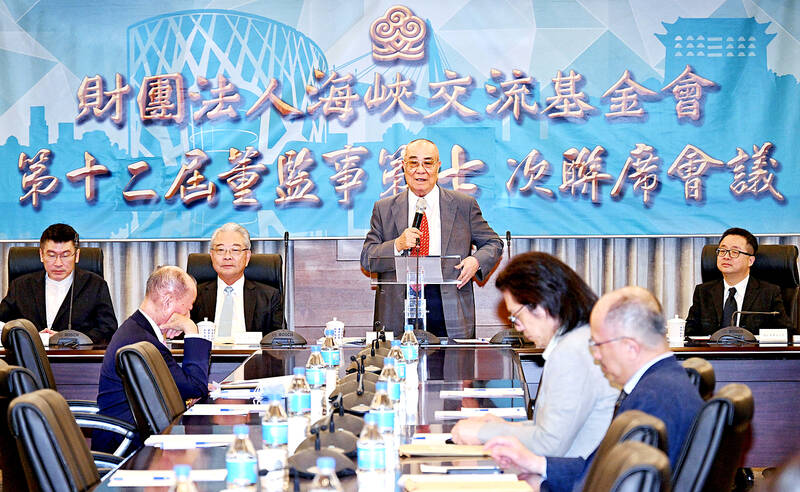Straits Exchange Foundation (SEF) Chairman Frank Wu (吳豊山) yesterday called on China to halt its “united front” work, adding that political interference and military provocations do nothing in Taiwan except draw the nation’s ire.
He made the comments at the seventh SEF board meeting in Taipei.
“United front” is a commonplace phrase in China, but Taiwanese hold it in the same regard as swear words, as it stands for Beijing’s efforts to infiltrate and sow division in their nation, Wu said.

Photo: Fang Pin-chao, Taipei Times
The leaders of Taiwan and China both support the peaceful development of cross-strait relations in a rare point of agreement, he said.
China should cherish the historical opportunity of finding common ground with Taiwan and not undermine it at every turn by sending military ships and aircraft to harass the latter, he added.
China can either bring peace and improve the lives of people across the Strait by acting on this agreement or, by acting against it, earn the mockery of history and prove the hollowness of its words, he said.
“For many years, our opposite number insisted that the peoples across the Strait share the same racial origins and language in hopes that Taiwanese would join the symphony of the Chinese family,” he said.
“This song is very much lost amid the ceaseless political infiltration [of Taiwan] and the deafening din of [Chinese] warships and jets,” Wu said. “There is no way Taiwanese would accept this deviation between [China’s] words and actions.”
President William Lai’s (賴清德) call for China to engage in cross-strait dialogue and peaceful exchanges has remained unchanged since his inauguration speech on May 20 last year, he said.
A war in the Taiwan Strait would do tremendous harm to Taiwan and China, but no peaceful alternative is possible unless both sides choose to bear sincere goodwill in all their interactions, he said.
The spirit of goodwill has been notably absent in the contemptuous and bellicose attitude of Chinese officials and government ministries, he said.
China, which vowed to rid itself of its century of humiliation by rising to great power status, should find inspiration and optimism in Taiwan’s achievements, he said.
China’s Association for Relations Across the Taiwan Straits is reminded that ancient grudges borne by long-dead men should be left with the dead and that its energy is better spent on benefiting the living, he said.

Taiwanese were praised for their composure after a video filmed by Taiwanese tourists capturing the moment a magnitude 7.5 earthquake struck Japan’s Aomori Prefecture went viral on social media. The video shows a hotel room shaking violently amid Monday’s quake, with objects falling to the ground. Two Taiwanese began filming with their mobile phones, while two others held the sides of a TV to prevent it from falling. When the shaking stopped, the pair calmly took down the TV and laid it flat on a tatami mat, the video shows. The video also captured the group talking about the safety of their companions bathing

US climber Alex Honnold is to attempt to scale Taipei 101 without a rope and harness in a live Netflix special on Jan. 24, the streaming platform announced on Wednesday. Accounting for the time difference, the two-hour broadcast of Honnold’s climb, called Skyscraper Live, is to air on Jan. 23 in the US, Netflix said in a statement. Honnold, 40, was the first person ever to free solo climb the 900m El Capitan rock formation in Yosemite National Park — a feat that was recorded and later made into the 2018 documentary film Free Solo. Netflix previewed Skyscraper Live in October, after videos

Starting on Jan. 1, YouBike riders must have insurance to use the service, and a six-month trial of NT$5 coupons under certain conditions would be implemented to balance bike shortages, a joint statement from transportation departments across Taipei, New Taipei City and Taoyuan announced yesterday. The rental bike system operator said that coupons would be offered to riders to rent bikes from full stations, for riders who take out an electric-assisted bike from a full station, and for riders who return a bike to an empty station. All riders with YouBike accounts are automatically eligible for the program, and each membership account

A classified Pentagon-produced, multiyear assessment — the Overmatch brief — highlighted unreported Chinese capabilities to destroy US military assets and identified US supply chain choke points, painting a disturbing picture of waning US military might, a New York Times editorial published on Monday said. US Secretary of Defense Pete Hegseth’s comments in November last year that “we lose every time” in Pentagon-conducted war games pitting the US against China further highlighted the uncertainty about the US’ capability to intervene in the event of a Chinese invasion of Taiwan. “It shows the Pentagon’s overreliance on expensive, vulnerable weapons as adversaries field cheap, technologically